Related Research Articles

Honduras was inhabited by many indigenous peoples when the Spanish arrived in the 16th century. The western-central part of Honduras was inhabited by the Lencas, the central north coast by the Tol, the area east and west of Trujillo by the Pech, the Maya and Sumo. These autonomous groups maintained commercial relationships with each other and with other populations as distant as Panama and Mexico. Honduras has ruins of several cities dating from the Mesoamerican pre-classic period that show the pre-Columbian past of the country.

The United Fruit Company was an American multinational corporation that traded in tropical fruit grown on Latin American plantations and sold in the United States and Europe. The company was formed in 1899 from the merger of the Boston Fruit Company with Minor C. Keith's banana-trading enterprises. It flourished in the early and mid-20th century, and it came to control vast territories and transportation networks in Central America, the Caribbean coast of Colombia, and the West Indies. Although it competed with the Standard Fruit Company for dominance in the international banana trade, it maintained a virtual monopoly in certain regions, some of which came to be called banana republics – such as Costa Rica, Honduras, and Guatemala.
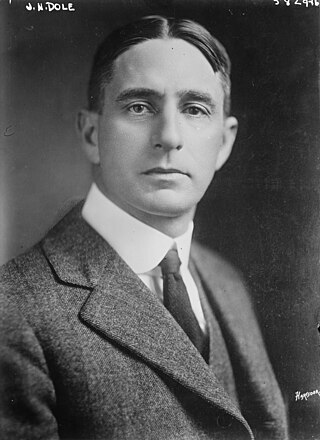
James Drummond Dole, also known as the "Pineapple King", was an American industrialist who developed the pineapple industry in Hawaii. He established the Hawaiian Pineapple Company (HAPCO) which was later reorganized to become the Dole Food Company and now operates in over 90 countries. Dole was a cousin of Sanford B. Dole, President of the Republic of Hawaii.
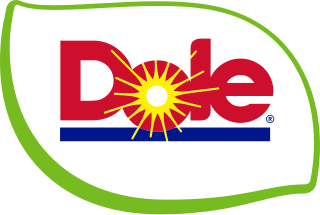
Dole plc is an Irish-American agricultural multinational corporation headquartered in Dublin, Ireland. The company is among the world's largest producers of fruit and vegetables, operating with 38,500 full-time and seasonal employees who supply some 300 products in 75 countries. Dole reported 2021 revenues of $6.5 billion.
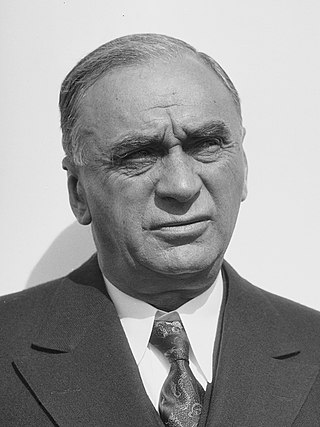
Samuel Zemurray, nicknamed "Sam the Banana Man", was an American businessman who made his fortune in the banana trade. He founded the Cuyamel Fruit Company and later became president of the United Fruit Company, the world's most influential fruit company at the time. Both companies played highly controversial roles in the history of several Latin American countries and had a significant influence on their economic and political development.

Standard Fruit Company was established in the United States in 1924 by the Vaccaro brothers. Its forerunner was started in 1899, when Sicilian Arberesh immigrants Joseph, Luca and Felix Vaccaro, together with Salvador D'Antoni, began importing bananas to New Orleans from La Ceiba, Honduras. By 1915, the business had grown so large that it bought most of the ice factories in New Orleans in order to refrigerate its banana ships, leading to its president, Joseph Vaccaro, becoming known as the "Ice King".

Castle & Cooke, Inc., is a Los Angeles-based company that was once part of the Big Five companies in territorial Hawaii. The company at one time did most of its business in agriculture, including becoming, through mergers with the modern Dole Food Company, the world's largest producer of fruits and vegetables. In 1995, it was spun off from Dole and today most of the company's business is in real estate and residential, commercial and retail development.

The Banana Wars were a series of conflicts that consisted of military occupation, police action, and intervention by the United States in Central America and the Caribbean between the end of the Spanish–American War in 1898 and the inception of the Good Neighbor Policy in 1934. The military interventions were primarily carried out by the United States Marine Corps, which also developed a manual, the Small Wars Manual (1921) based on their experiences. On occasion, the United States Navy provided gunfire support and the United States Army also deployed troops.

Railroads in Honduras were built in late 19th and early 20th centuries by two competing U.S. corporations - United Fruit and Standard Fruit. All were in the Caribbean coastal area and never reached the capital. In 1993, the combined network had 785 km (488 mi). At present (2006), only three separate segments remain in operation under the management of FNH - Ferrocarril Nacional de Honduras:

In political science, the term banana republic describes a politically and economically unstable country with an economy dependent upon the export of natural resources. In 1904, American author O. Henry coined the term to describe Guatemala and Honduras under economic exploitation by U.S. corporations, such as the United Fruit Company. Typically, a banana republic has a society of extremely stratified social classes, usually a large impoverished working class and a ruling class plutocracy, composed of the business, political, and military elites. The ruling class controls the primary sector of the economy by way of exploitation of labour. Therefore, the term banana republic is a pejorative descriptor for a servile oligarchy that abets and supports, for kickbacks, the exploitation of large-scale plantation agriculture, especially banana cultivation.

Leon Winfield Christmas, usually called Lee Christmas, was an American mercenary in Central America.

Banana production in Honduras plays an important role in the economy of Honduras. In 1992, the revenue generated from banana sales amounted to US$287 million and along with the coffee industry accounted for some 50% of exports. Honduras produced 861,000 tons of bananas in 1999. The two corporations, Chiquita Brands International and the Dole Food Company are responsible for most Honduran banana production and exports.
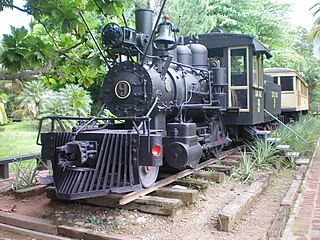
Honduras is a republic in Central America, at times referred to as Spanish Honduras to differentiate it from British Honduras, which became the modern-day state of Belize.

Banana boat is a descriptive nickname that was given to fast ships, also called banana carriers, engaged in the banana trade. They were designed to transport easily spoiled bananas rapidly from tropical growing areas to North America and Europe. They often carried passengers as well as fruit.

Cuyamel Fruit Company, formerly the Hubbard-Zemurray Steam Ship Company, was an American agricultural corporation operating in Honduras from 1911 until 1929, before being purchased by the United Fruit Company. The company was founded in the 1890s by William Streich to export bananas and sugar from the northwestern Cortés region of Honduras to international markets. It was bought by Samuel Zemurray around 1905, who took the company name for his own operation. Zemurray would later become the president of the United Fruit Company. Both Cuyamel and United Fruit are corporate ancestors of the modern-day firm Chiquita Brands International.
Joseph Nicholas Macaluso Sr. is an American musician, counselor, teacher, administrator, veteran of World War II and the Korean War, and retired colonel. He is also an author, Italian-American Civic Award recipient, and civic leader.
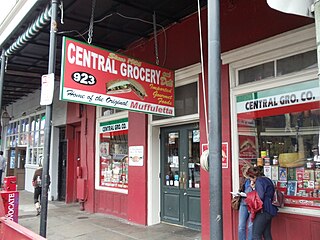
Italians have had a presence in the New Orleans area since the explorations of the Europeans. Many Sicilians immigrated to New Orleans in the 19th century, traveling on the Palermo-New Orleans route by ship. The number of Italians who immigrated in the late 19th century greatly exceeded those who had come before the American Civil War. Only New York City has a higher population of Sicilian-Americans and Sicilian immigrants than New Orleans.
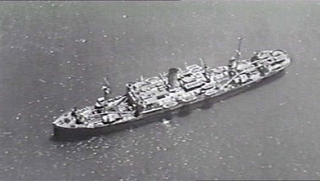
Contessa was a refrigerated cargo and passenger ship of 5,512 GRT built by Barclay, Curle & Co., Glasgow for Vaccaro Brothers & Company launched 18 February 1930. The ship, along with sister ship Cefalu, served ports in the United States, Cuba, and Central America specifically La Ceiba, Honduras which is still a port for the fruit trade. The ship became part of the Standard Fruit Company, a company established by Vaccaro Brothers, and operated as a cargo passenger vessel until taken over at New Orleans by the War Shipping Administration (WSA) on 29 May 1942 with Standard Fruit Company remaining as the WSA operating agent. The ship was later bareboat sub chartered to the United States War Department 14 July 1943 and operated in the Army's Southwest Pacific Area local fleet under the local fleet number X-96 from 18 September 1943 into 1945 as a troop ship. The ship was returned to WSA with Standard Fruit again its agent on 28 May 1946 in Brooklyn until returned to the company for commercial operation at New Orleans on 20 August 1947.
Hospital Vicente D'Antoni is a hospital in La Ceiba, Honduras established on February 4, 1924 in a formal ceremony conducted by the nation's President. It is one of the best hospitals in the republic and was greatly assisted for a number of years by the arrival of two nurses from New England from Sisters of Mercy, who opened up a nursing school at the hospital.
The Atlantic Fruit Company was an American shipping company formed in 1905 by Joseph Di Giorgio in Baltimore. Di Giorgio arrived in Baltimore from Sicily in 1899. When he moved to California in 1911, the business was worth $12 million.
References
- 1 2 3 "Vaccaro Brothers | Encyclopedia.com". www.encyclopedia.com. Retrieved 2023-03-06.
- 1 2 3 "Standard Fruit Co. / Vaccaro Brothers". www.theshipslist.com. Retrieved 2023-03-06.
- 1 2 "Vaccaro Bros & Co – Just blogging away … doing the hard blog". Just blogging away ... doing the hard blog. 14 November 2018. Retrieved 2023-03-06.
- ↑ "Honduras - The Expanded Role of the United States". countrystudies.us. Retrieved 2023-03-06.
- 1 2 Terrell, Ellen (2018-10-11). "Sam the Banana Man | Inside Adams". The Library of Congress. Retrieved 2023-03-06.
- ↑ "United Fruit Company - Chronology". www.unitedfruit.org. Retrieved 2023-03-06.
- ↑ RedHonduras.com (2022-10-09). "List of Governors and Presidents of Honduras". RedHonduras.com - El referente de Honduras. Retrieved 2023-03-06.
- ↑ "Banco Atlántida | INVATLAN". invatlan.hn. Retrieved 2023-03-06.
- 1 2 Modern Hospital. McGraw-Hill. 1922.
- 1 2 "Castle & Cooke History: Founding, Timeline, and Milestones - Zippia". www.zippia.com. 2020-08-27. Retrieved 2023-03-06.
- ↑ Karnes, Thomas L. (1978). Tropical enterprise : the Standard Fruit and Steamship Company in Latin America. Internet Archive. Baton Rouge : Louisiana State University Press. ISBN 978-0-8071-0395-1.